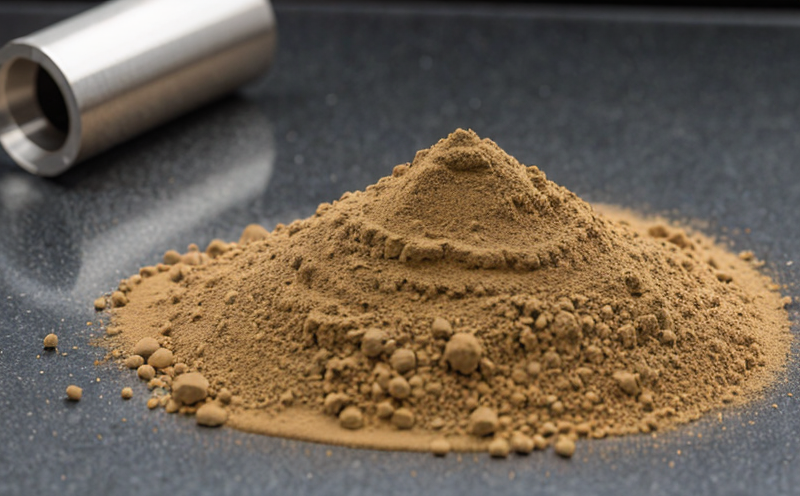ASTM D5026 Dynamic Mechanical Testing of Plastics
The ASTM D5026 standard provides a comprehensive framework for determining the viscoelastic properties of plastics using dynamic mechanical analysis (DMA). This test is particularly valuable in quality management, compliance, and research and development contexts as it helps identify the thermal behavior and mechanical properties such as storage modulus, loss modulus, and damping factor. DMA testing is essential for evaluating raw materials to ensure they meet specific performance criteria required by end-users.
The process involves heating a specimen at a controlled rate while applying oscillatory shear stress to measure its response over temperature. The results provide critical insights into the material's behavior under dynamic loading conditions, which are crucial for understanding how it will perform in real-world applications. This test is especially useful in additive manufacturing and 3D printing sectors where the mechanical properties of raw materials can significantly impact final product performance.
For quality managers and compliance officers, ASTM D5026 ensures that raw materials meet stringent industry standards. In R&D settings, this testing method allows engineers to optimize material formulations and process parameters. For procurement teams, it offers a reliable way to verify the consistency of supplier deliveries against specified requirements.
The test setup typically includes an oscillatory shear rheometer capable of applying controlled thermal cycling with precise temperature control. Specimens are usually prepared as small rectangular blocks or films. The DMA instrument records data on the specimen's deformation and stress-strain relationship throughout the temperature range.
| Applied Standards | Description |
|---|---|
| ASTM D5026-18 | Standard Practice for Dynamic Mechanical Measurements of Viscoelastic Polymer Materials |
| ISO 7619:2003 | Dynamic mechanical thermal analysis—Determination of viscoelastic properties from the complex modulus and tangent delta |
The DMA testing procedure involves several critical steps. Specimens are conditioned at a specified temperature for a defined period before testing to ensure homogeneity. The test then proceeds by heating the specimen while applying an oscillatory shear stress. Data acquisition includes recording the storage modulus (G'), loss modulus (G'') and tangent delta (tan δ), which represent the elastic, viscous, and damping behavior of the material respectively.
Interpretation of these parameters provides valuable information about the thermal stability and mechanical resilience of the plastic at various temperatures. This data is crucial for selecting appropriate materials that can withstand operational conditions without degradation or failure. The results also inform process optimization efforts to enhance productivity and quality.
Applied Standards
| Standard | Description |
|---|---|
| ASTM D5026-18 | This standard outlines the practice for dynamic mechanical measurements of viscoelastic polymer materials. It specifies the test conditions, specimen preparation, and data acquisition methods essential for accurate DMA testing. |
| ISO 7619:2003 | ISO's equivalent standard to ASTM D5026, detailing dynamic mechanical thermal analysis procedures. This provides a benchmark for consistent testing across different laboratories and jurisdictions. |
The application of these standards ensures that the test results are reliable, reproducible, and comparable across various environments. Compliance with ASTM D5026-18 is particularly important in industries where precise material properties are critical to product performance and safety.
Scope and Methodology
The scope of the ASTM D5026 test encompasses the determination of viscoelastic properties of thermoplastics, elastomers, and other polymer materials. The primary focus is on understanding how these materials behave under dynamic loading conditions over a range of temperatures.
- Testing at various temperatures allows for the identification of the glass transition temperature (Tg) and melting point (Tm).
- The storage modulus (G') indicates the material's stiffness or resistance to deformation, while the loss modulus (G'') reflects its damping capacity or energy absorption.
These properties are crucial for predicting how a plastic will perform in real-world applications such as automotive components, medical devices, and aerospace parts. The methodology involves conditioning the specimens at specified temperatures, applying oscillatory shear stress, and recording the resulting deformation and stress-strain relationship.
The DMA instrument used must be capable of precise temperature control to maintain consistent test conditions. Data acquisition typically includes storing modulus (G'), loss modulus (G''), and tangent delta (tan δ) values for each temperature increment. These parameters provide a comprehensive view of the material's viscoelastic behavior, enabling informed decisions regarding raw material selection and process optimization.
Why Choose This Test?
The ASTM D5026 test is essential for ensuring that raw materials meet specific performance criteria required by end-users. It provides detailed insights into the thermal and mechanical properties of plastics, which are critical for additive manufacturing and 3D printing processes.
By identifying the glass transition temperature (Tg) and melting point (Tm), this test helps in selecting appropriate materials that can withstand operational conditions without degradation or failure. This is particularly important in sectors where material performance under dynamic loading is a key concern.
The DMA testing method is versatile, allowing for the evaluation of various polymer types including thermoplastics and elastomers. It offers precise data on material behavior over temperature ranges, which is invaluable for R&D efforts aimed at optimizing formulations and processes.
Furthermore, compliance with ASTM D5026 ensures that materials meet stringent industry standards, enhancing product quality and reliability. This test is particularly beneficial in industries where precision and consistency are paramount, such as automotive manufacturing or medical device production.





